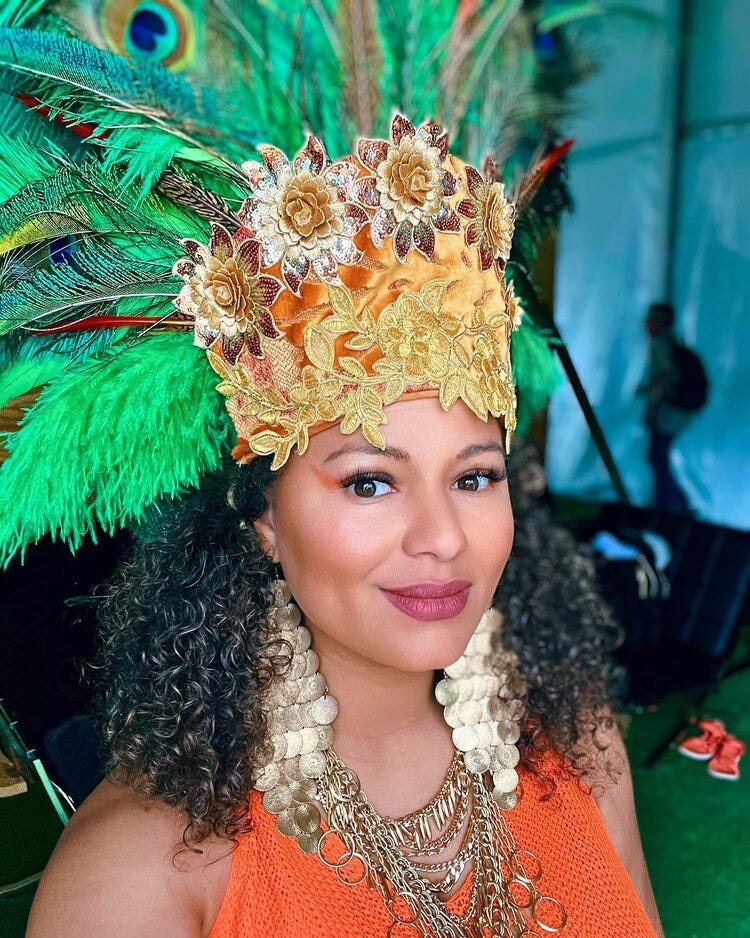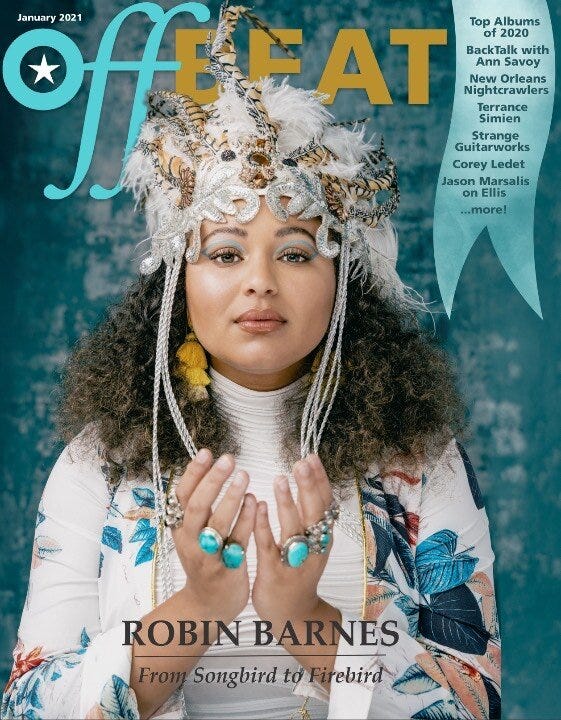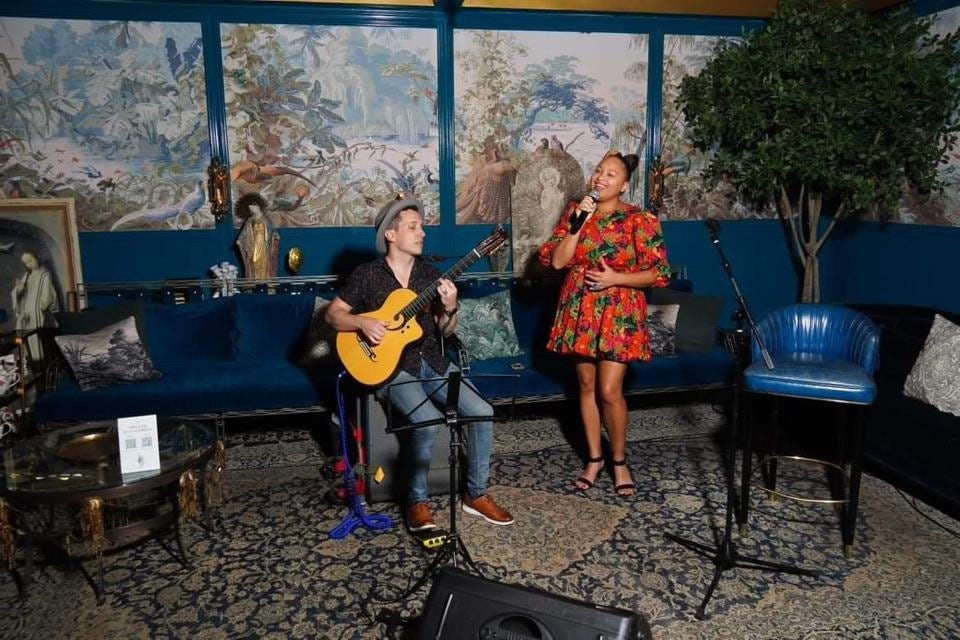Robin Barnes: On the importance of business school and being told her career is over
Advice from the Songbird of New Orleans
Meet our next creator, Robin Barnes:
Robin Barnes
Age: 35*
Kids: “Baby Bird One,” 3 1/2; “Baby Bird Two,” 3 1/2 months
Vocation: Vocalist
Location: New Orleans
Links: Robin Barnes, Instagram
*Ages at time of interview
I recently got a flat tire. I was with a friend, and it was dark and rainy, and we were standing in our fancy clothes on the side of an empty country road. Although it sounds like the setting for a horror movie, these days, if you have a charged phone and reception, it’s really just an inconvenience.
But it was the solutions themselves that I found a bit upsetting. When it was established that, no, I do not have AAA, we called…my friend’s husband. He told us about the kit in the trunk that could pump up the tire enough for us to get home.
While we were trying to read the pump’s instructions by the light of my phone, a car pulled up to see if we needed help. The driver was a man, and he had a portable tire inflator. You just connect it to the valve, type in the desired tire pressure, and hit a button. In 30 seconds, the tire was full and we were on our way. The utter competency of this man was breathtaking.
Incredibly lucky, all of it. But it has left me disturbed at my ineptitude.
Some smart thinkers out there theorize that this is by design. That women aren’t taught certain life skills so they remain dependent on men and the institution of marriage. Perhaps that’s the case. But we are lucky enough to live in a place where, if we’re not in an abusive situation, we can control what we do and what we learn.
While I know I need to take charge of my lack of practical skills, I often wonder if we could have been set up better when we were young with the help of the public school system. My brain was so malleable back then! Some of the questions that snarky teenagers ask in high school are valid ones—the “Why do I have to learn X” and “When am I ever going to use Y” sorts of questions. I think I would have benefitted more from a class on how to obtain a mortgage and buy a house than learning about sine and cosine. Or what about, instead of pegging each other with rubber balls in a gym, we’d had a class on how to grow your own food in case something like, I don’t know, a pandemic happens?
My point, simply, obviously, is that the more advanced a society becomes, the more some of us lose basic survival skills. And that makes us dependent on others and dependent on making enough money to pay these others. While I’m still figuring out what to do about that for myself, and how to avoid doing the same thing to my children (can I pay for a camp to teach them life skills since I’m a lost cause? Ugh.), my interviewee this week is living proof of how valuable practical knowledge is, even, or maybe especially, for a creative type.
I had the pleasure of talking with the singer Robin Barnes a few months ago. While we were chatting, she was feeding her three-year-old who was home sick, and her baby who had been napping woke up near the end of our talk. Her husband was elsewhere in the house learning songs for a performance, all while a worker was fixing the oven and someone else was outside in the yard fixing the fence. It was, of course, chaos. But Robin has learned to handle everything by doing something she says women excel at: planning. And it is because of planning—planning her career as a business rather than a passion—that she has managed to make a living as a singer, from growing up in the lower ninth ward of New Orleans to performing at the Royal Opera House in London.
If women are good at planning—and if you look at what’s in a woman’s purse, the evidence seems to point to yes—then we can plan for not only every bodily function that we might face but also for whatever life might throw at us. And looking to Robin for some guidance on how to do this is a good start.
Now, Robin, in her own words…
On the importance of understanding business:
My family’s always been nervous because music is a very challenging industry, to say the least, and navigating it is difficult. Obviously, there’s so much adversity being a woman, but also a woman of color, and it’s one of the most male-dominated industries. So my family had me go to school for business instead of music. I majored in business and marketing as my undergrad. And I completed my master’s in business right after my undergrad in like a year and a half. I just wanted to get done so I could pursue my music.
The reality is that music school doesn’t teach musicians and artists about business. You have to understand that my whole life is music, so I was learning a secondary education from music with my family and performing live. I was learning it hands-on. And then I was going to school for business. I tried to do the corporate route and do music on the side, and it just wasn’t for me. If I can do an amazing job marketing another person’s dream—and get paid pennies—why can’t I do mine? And that’s when I decided to be my own manager, be in charge of my own creatives.
You know, I hated, hated that my parents made me go to school for business and not music. I really did, because all my siblings got to go to school for music. And I was like, why not me? I’m the seventh child. And they were like, no, you’re the girl. You have to do something different. And I was so mad. I was like, how am I going to have a successful career if I don’t go to school for music? And now I’m like, wow, how could you have a career without understanding business?
On the key to longevity:
From a very young age, I always wanted to stand out and really do my best to have more control over my narrative, more control over my story, my path. What has helped me be successful was my learning how to pivot. To constantly pivot.
I got to really learn how to do that in the pandemic. During the pandemic, my husband and I were brand-new parents. We were two musicians, (he’s a bass player), so that means we had no work, no money. We had to try to get donations by performing on our Facebook live to our fans. From there, my husband was like, “Well, I’ll learn guitar.” So he learned guitar in like three months, and we were having this kind of cute little variety show for our family.
When we got out of the pandemic, I really enjoyed my husband and I doing it as a duo and realized it was kind of a fun band. So we ended up creating a band called Da Lovebirds. So from there, we ended up doing a residency and traveling the world. People started booking us for weddings in New York, weddings in Miami. And then we would travel to London. It was crazy.
So now I’m known as The Songbird, which is Robin Barnes. Then I’m also in the duo band with my husband called Da Lovebirds. And then for the larger, high-energy festival circuit, I have the Fiya Birds. So I’m always learning how to pivot; that’s the best way.
On being told her career is over:
When I was five months pregnant with my first child—I’ll never forget—two singers came up to me at different times and told me my entire career was over. Instead of saying, “Congratulations,” they were like, “Oh girl, your whole life’s over.” I was disappointed because one of them was a mother. And it freaked me out. It really did.
But I am that person that if you tell me I can’t do something, I will prove you wrong. I will run circles around you. So when she told me that, I was like, “Well, you know what? My career is going to thrive.”
I made an Instagram post about it. The first year out of COVID, when my daughter was two, I had done two television shows. I had performed in several different countries. I was getting all these accolades, and I showed it all on this reel. Then I go, “But, you know, someone told me my career was going to be over, and now my career is better.”
It’s going to be hard. Oh, my god, it’s going to be hard. But if you know it’s going to be hard, that’s the easy part. Because then you can prepare. We as women over plan our lives. Like, some people pre-plan their weddings when they’re 18 years old. Some people plan for retirement when they’re 22. We are planners. And it’s one of those things where if you already know that something’s going to be hard, you can plan toward it.
On how experience changes your voice:
I sang my best when I was pregnant. I’m a soprano one to alto two. So I can do really, really high to really, really low. When I was pregnant with Baby Bird Number Two, I felt like I was singing to the heavens. I definitely think I could have broke some glass. I was hitting some crazy notes. And then that high register definitely disappeared. My range is still the same, but now I’m back at just having power. I have a lot of power.
I feel like my voice has gotten better since I’ve had my kids. It’s almost like, man, once you survive childbirth, things that used to make you nervous or self-conscious kind of melt away. I used to be nervous about my vocal runs. Now I’ve been just subconsciously doing them, and I didn’t even realize I was doing it.
It’s almost like you have more richness, more depth. That’s why I feel like my runs are easier, because having children has given me more experience, more soul in my tone and in my voice.
On little wins:
At the end of the day, do not expect perfection. This is not a test. This is not something that you’re going to get a grade on. This is life. You take the little wins and you survive. My little win today is I took an amazing three-mile walk. And yes, the rest of my day is going to be hectic and crazy. But I took time for that walk for myself. I planned to have help for that.
Thank you for sharing, Robin!
*Interview has been edited for length and clarity.






Beautiful, as always Kim